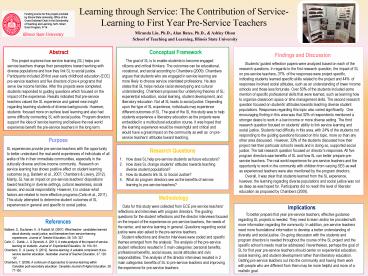Learning through Service: The Contribution of Service-Learning to First Year Pre-Service Teachers - PowerPoint PPT Presentation
Title:
Learning through Service: The Contribution of Service-Learning to First Year Pre-Service Teachers
Description:
Learning through Service: The Contribution of Service-Learning to First Year Pre-Service Teachers Miranda Lin, Ph.D., Alan Bates, Ph.D., & Ashley Olson – PowerPoint PPT presentation
Number of Views:71
Avg rating:3.0/5.0
Title: Learning through Service: The Contribution of Service-Learning to First Year Pre-Service Teachers
1
Learning through Service The Contribution of
Service-Learning to First Year Pre-Service
Teachers
Miranda Lin, Ph.D., Alan Bates, Ph.D., Ashley
Olson School of Teaching and Learning, Illinois
State University
Conceptual Framework The goal of SL is to
enable students to become engaged citizens and
critical thinkers. The outcomes can be
educational, vocational, and social according to
Chambers (2009). Chambers argues that students
who are engaged in service learning are more
likely to choose service orientated professions.
He also states that SL helps reduce racial
stereotyping and cultural understanding. Chambers
proposes four underlying theories of SL
experiential education, social learning, student
development, and liberatory education. Not all SL
leads to social justice. Depending upon the type
of SL experience, individuals may experience
different outcomes of SL. The goal of the SL this
study was to help students experience a
liberatory education as the projects were
embedded in a multicultural education course. It
was hoped that the learning experience would be
meaningful and critical and would have a great
impact on the community as well as on
pre-service teachers attitudes toward teaching.
Abstract This project explores how service
learning (SL) helps pre-service teachers change
their perceptions toward working with diverse
populations and how they link SL to social
justice. Participants included 28 first year
early childhood education (ECE) pre-service
teachers and five directors of pre-k programs
that serve low income families. After the
projects were completed, students responded to
guiding questions which focused on the impact of
the experience. Results indicated that
pre-service teachers valued the SL experience and
gained new insight regarding teaching students of
diverse backgrounds. However, students focused
more on surface level learning and also had some
difficulty connecting SL with social justice.
Program directors support the idea of service
learning and believe the real world experience
benefit the pre-service teachers in the long term.
- Research Questions
- How does SL help-pre-service students as future
educators? - How does SL change students attitudes towards
teaching diverse student populations? - How do students link SL to Social Justice?
- What do program directors see as the benefits of
service learning to pre-service teachers?
Methodology Data for this study were
collected from ECE pre-service teachers
reflections and interviews with program
directors. The guiding questions for the student
reflections and the director interviews focused
on the impact of the experience on pre-service
teachers, the needs of the center, and service
learning in general. Questions regarding social
justice were also asked to the pre-service
teachers. Student reflections and director
interviews were coded and specific themes emerged
from the analysis. The analysis of the
pre-service student reflections resulted in 5
main categories personal benefits, professional
benefits, social issues, social attitudes and
civic responsibilities. The analysis of the
director interviews resulted in 2 main
categories benefits of SL to pre-service
teachers and improving the experience for
pre-service teachers.
Implications To better prepare first year
pre-service teachers, effective guidance
regarding SL projects is needed. They need to
learn and/or be provided with more information
regarding the community. In addition, pre-service
teachers need more foundational information to
develop a better understanding of diversity and
social justice. On-going discussion with the
students and program directors is needed
throughout the course of the SL project and the
specific schools needs must be addressed.
Nevertheless, perhaps the goal of SL for first
year pre-service teachers should center on
experiential education, social learning, and
student development rather than liberatory
education. Getting pre-service teachers out into
the community and having them work with people
who are different from them may be more helpful
and more of a realistic goal.
References Baldwin, S., Buchanan, A.,
Rudisill, M. (2007). What teacher candidates
learned about diversity, social justice, and
themselves from service-learning experiences.
Journal of Teacher Education, 58, 315-
327.Celio, C., Durlak, J., Dymnicki, A.
(2011). A meta-analysis of the impact of
service- learning on students. Journal of
Experiential Education, 34, 164-181.Chambers,
D., Lavery, S. (2012). Service-learning A
valuable component of pre- service teacher
education. Australian Journal of Teacher
Education, 37, 128- 137.Chambers, T. (2009). A
continuum of approaches to service-learning
within Canadian post-secondary education.
Canadian Journal of Higher Education, 39, 77-100.































